On This Date: Michael Phelps vs. Milorad Cavic: A Half-Stroke To History at Beijing Games (Video)
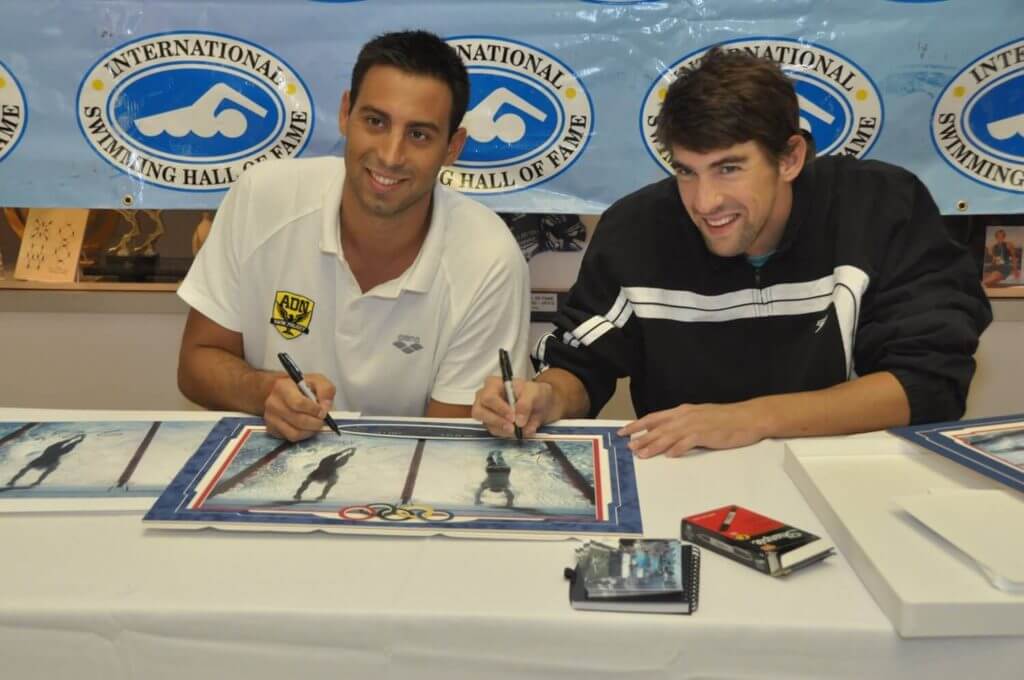
On This Date: Michael Phelps vs. Milorad Cavic: A Half-Stroke To History at Beijing Games
With just a few strokes remaining in the 100-meter butterfly duel between Michael Phelps and Milorad Cavic at the 2008 Olympic Games in Beijing, Phelps’ pursuit of eight gold medals looked over. Cavic had a visible lead, until Phelps dipped into his bag of magic tricks and pulled out an improbable victory. Today, August 16, marks the anniversary of that showdown.
Through six events at the 2008 Olympic Games in Beijing, Michael Phelps was perfect. With the exception of needing an epic, come-from-behind performance by anchor Jason Lezak for the United States to win the 400 freestyle relay over France, Phelps was an unstoppable force. He wasn’t just winning events at the Water Cube, the nickname for the state-of-the-art Beijing Aquatic Center. He was destroying the competition, prevailing by margins typically reserved for an ahead-of-the-curve swimmer at the age-group level.
At the international level, hundredths of a second are supposed to separate the top finishers, such is the narrow difference in skill. Phelps didn’t play that game. His triumphs were routs, the rest of the field competing for silver and bronze medals. He won the 200 freestyle by nearly two seconds. He won the 200 individual medley and 400 individual medley by more than seconds each. Although he won the 200 butterfly by “only” 67 hundredths of a second, there was a reason: Phelps raced the event with limited vision, his goggles having filled up with water at the start.
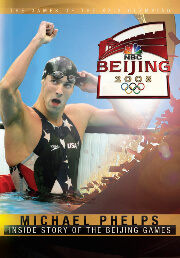 By the time the final of the 100 butterfly was contested, however, Phelps was – not surprisingly – running low on energy. To that point, he had raced 15 times. Not all of his swims required maximum effort, but the totality of the events, coupled with media obligations and drug-testing procedures, had started to take their toll. Phelps and his coach Bob Bowman admitted to the onset of exhaustion and the importance of remaining mentally sharp in order to fend off the physical drain.
By the time the final of the 100 butterfly was contested, however, Phelps was – not surprisingly – running low on energy. To that point, he had raced 15 times. Not all of his swims required maximum effort, but the totality of the events, coupled with media obligations and drug-testing procedures, had started to take their toll. Phelps and his coach Bob Bowman admitted to the onset of exhaustion and the importance of remaining mentally sharp in order to fend off the physical drain.
“I’ve got nothing left,” Phelps said after winning the 200 individual medley.
Indeed, Phelps did have some gas in the reserve tank, and he needed every ounce of that fuel for the 100 butterfly. Before the 2008 Games started, the 100 fly was viewed as the biggest individual obstacle on Phelps’ road to eight gold medals. For one, it was late in the program and a weary Phelps would clash with much-fresher opponents. More, it was his only 100-meter race, and Phelps was much-better suited for events which were 200 meters in length, or 400 meters in the case of one of the individual medley disciplines.
The biggest obstacle, however, was the presence of Serbia’s Milorad Cavic, a speedster who would undoubtedly surge to a fast start, take a sizable lead on Phelps and try to hold on for dear life. Cavic was viewed as one of two legitimate threats to Phelps, along with American Ian Crocker, the world-record holder at the time and silver medalist to Phelps at the 2004 Olympics in Athens.
While Cavic was rising and getting faster, Crocker wasn’t the force he was in the middle of the decade, especially at the 2005 World Championships in Montreal. There, Crocker set the world record and defeated Phelps handily, the race never in question. Like Cavic, Crocker was a fast starter and building an advantage on Phelps during the first lap was the only way to beat him. Cavic knew all about that strategy. Brash and unafraid to speak his mind, Cavic also believed Phelps was beatable.
“You definitely want to shoot for the gold,” Cavic said two months before the Beijing Games. “As much as the world would like to be entertained to see Michael Phelps get eight gold medals, I don’t want to give it to him. I hope to stand in the way. I hope to slay the dragon. I don’t know if I can say that, but I did just say it. And that’s kind of what it is. Everyone has this idea that he’s unbeatable, and he’s not. I think I’m going to have a shot.”
Cavic wasn’t the typical European foe of Phelps, a la Hungarian Laszlo Cseh, who was second to Phelps in Beijing in the 200 butterfly, 200 individual medley and 400 individual medley. Unlike Cseh, born and raised in Hungary, Cavic was born in Anaheim, Calif. to parents who immigrated to the United States from the former Yugoslavia. He was a national-record setter for Tustin High School and was named Swimming World Magazine’s Male High School Swimmer of the Year in 2002. Known as Milorad on international entry and rankings lists, Cavic more frequently went by Michael or Mike while growing up, and while competing collegiately for the University of California-Berkeley.
Don’t be mistaken. Cavic wasn’t ignorant to his roots. He respected his parents’ heritage and the fight for freedom which gave Serbia its independence. That respect actually cost Cavic at the 2008 European Championships. After winning the 50 butterfly, Cavic protested Kosovo’s recent declared independence from Serbia by wearing a T-shirt on the awards podium which read, “Kosovo is Serbia.” The move was deemed a political gesture by meet officials and led to Cavic’s disqualification from the remainder of the meet.
Because he held dual citizenship between the United States and Serbia, Cavic had the choice of which nation to represent on the international stage. Undoubtedly, Serbia was the easier path. With the United States unmatched in its top-end talent and depth, qualifying for international competitions is viewed as difficult as competing in the international meet itself. By representing Serbia, Cavic avoided the grind faced by American swimmers.
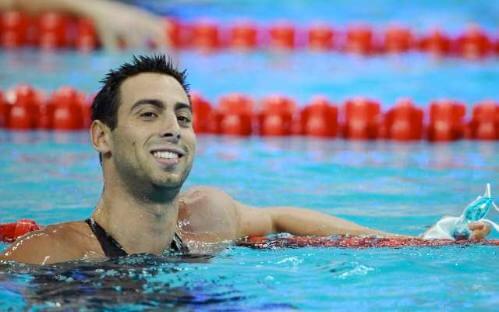
The 100 butterfly final in Beijing took place on Aug. 16. While Phelps was taking part in his 16th race, it was only Cavic’s fourth. Earlier in the week, Cavic posted the sixth-fastest time in the preliminaries of the 100 freestyle, a Serbian record of 48.15, but withdrew from the event before the semifinals in order to preserve energy for the 100 butterfly. Cavic’s only other races were the prelims and semifinals of the butterfly, both of which resulted in the 6-foot-5, 200-pounder posting the fastest time of the round.
The buzz in the Water Cube before the final was at one of its highest levels of the week, the spectators well aware of what they were about to witness. They knew Phelps was at his most vulnerable, and knew a Phelps victory would give him seven gold medals, tying the record achieved by Mark Spitz at the 1972 Olympics in Munich. Many Olympic experts believed Spitz’s record would never be touched, particularly with the sporting world more-well-rounded.
During introductions, both men showed little emotion. Cavic was in Lane Four and let out a few exhales as the television cameras followed his moves. Phelps, in Lane Five, maintained his typical routine, listening to music until his name was announced. They briefly looked at each other before climbing atop their blocks, but nothing was said.
“Most guys are trembling when they have to step up to Michael Phelps,” said Gary Hall Jr., the 10-time Olympic medalist who once trained with Cavic at The Race Club.” But (Cavic) did not fear him, and it showed.”
As expected, Cavic bolted to the front of the field off the blocks, surfacing ahead of Phelps. The Serbian continued to pour it on over the first lap, turning in a time of 23.42, well under world-record pace. In the adjacent lane, Phelps was lagging behind. He touched the wall in 24.04 at the midway point, placing him seventh and about a half-body length behind Cavic.
Using one of his patented powerful turns, Phelps cut into his deficit at the beginning of the second lap but was still trailing Cavic by a noticeable margin. Even as he picked off other swimmers between the 50-meter and 75-meter marks, there was a question as to whether he would get to Cavic. In the media section overlooking the pool, there was a tangible sense that history was coming to a close. The closer the race came to the finish, the greater the probability of a Phelps loss.
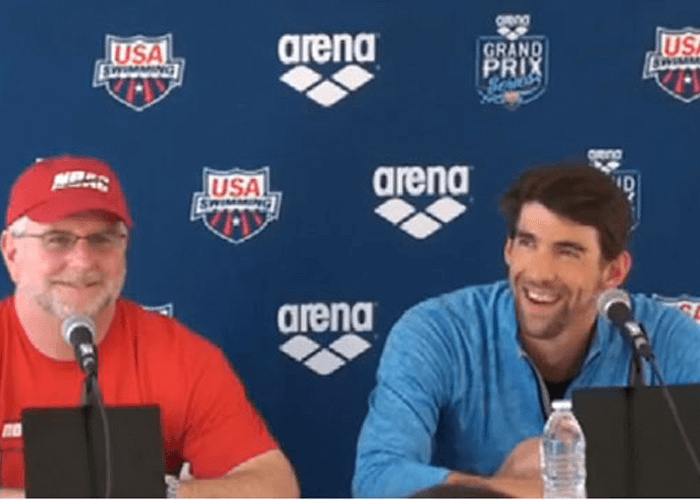 As Phelps and Cavic neared the wall for the finish, Cavic still maintained a clear edge. But on the finish, Cavic glided to the wall while Phelps took an extra half-stroke, an intuitive move which was not part of his normal routine. On most occasions, Phelps would glide to the wall, too, or get to the wall with a perfectly measured stroke. In this instance, something told him to go with a half-stroke. It proved to be a maneuver of genius.
As Phelps and Cavic neared the wall for the finish, Cavic still maintained a clear edge. But on the finish, Cavic glided to the wall while Phelps took an extra half-stroke, an intuitive move which was not part of his normal routine. On most occasions, Phelps would glide to the wall, too, or get to the wall with a perfectly measured stroke. In this instance, something told him to go with a half-stroke. It proved to be a maneuver of genius.
When the final results flashed on the giant scoreboard, the Water Cube erupted. The spectators, already standing, roared their approval when it was revealed Phelps was timed in 50.58, to the 50.59 of Cavic. Somehow, Phelps had won his seventh gold medal. It was an improbable triumph and simply added another chapter to Phelps’ legend. How did he pull it off?
“When I did chop the last stroke, I thought that had cost me the race,” Phelps said. “But it was actually the opposite. If I had glided, I would have been way too long. I took short, faster strokes to try to get my hand on the wall. I ended up making the right decision.”
Post-race Phelps comes in many forms. He has shown frustration, smirking at the scoreboard when viewing an unpleasing time. He has been nonchalant, almost void of reaction. He has smiled on occasion, allowing himself to cherish the moment. After the 100 butterfly in Beijing, Phelps was exuberant. He glanced at the scoreboard, digested its story and shot a fist into the air. That gesture was followed by a double-handed splash of the pool. This victory was one which meant as much as any prior gold medal.
Cavic, meanwhile, had a stunned look on his face. He knew we was out in front at the halfway point, and as the swimmers neared the end of the race. He seemed confused over his second-place finish and how Phelps found a way to beat him. The Serbian delegation didn’t believe it, either. Following the race, Serbia filed a protest and had FINA, the international governing body for swimming, view footage of the race. With the finish slowed to one frame every ten-thousandth of a second, it was confirmed that Phelps won.
Sports Illustrated photographer Heinz Kluetmeier, a legend in his profession, caught the finish from above, having set up equipment which was controlled by remote. The images revealed the paper-thin tightness of the finish and have gone down in sporting lore. Cavic, though, wasn’t convinced. He straddled the proverbial fence during interviews.
“I’m stoked with what happened,” Cavic said. “I don’t want to fight this. People will be bringing this up for years and saying you won that race. If we got to do this again, I would win it.”
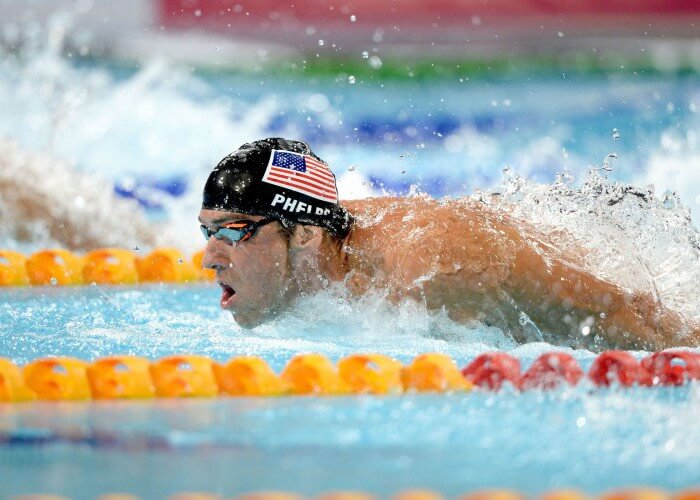
Photo Courtesy: Delly Carr
For all the blowout victories in his career, Phelps also had a reputation for eking out narrow decisions. At the 2004 Olympics in Athens, a similar storyline as to the matchup with Cavic played out. Trailing Crocker as the swimmers neared the finish of the 100 butterfly, Phelps crept on his American teammate and managed to get to the wall first, winning by four hundredths of a second. He also caught Crocker from behind in the 100 butterfly at the 2007 World Championships in Melbourne.
With his seventh gold medal, Phelps tied Spitz’s iconic record. A day later, Phelps handled the butterfly leg on the United States’ 400 medley relay and added his record-breaking eighth gold medal. Over the course of eight days, Phelps was perfect, packaging a meet filled with overwhelming victories and drama.
“It goes to show you that not only is this guy the greatest swimmer of all-time and the greatest Olympian of all-time, he’s maybe the greatest athlete of all-time,” Spitz said. “He’s the greatest racer who ever walked the planet.”
Cavic got another chance at Phelps a year later, when the 2009 World Championships were held in Rome. At the time, the sport was mired in controversy over the introduction of high-tech suits which made technology and what a swimmer was wearing more important than sheer talent. The suit dilemma, in part, stoked the rivalry between Phelps and Cavic.
First, Cavic suggested that the introduction of high-tech suits should be accepted by all, and in doing so said swimmers – Phelps in particular – should accept the change. He drew a parallel between the suits and the Omega timing system used at the Beijing Olympics, citing each as unfair in their own way.
“I’ve given this a lot of thought,” Cavic said. “Throughout this whole year, I’ve just been hearing a lot of white noise over this suit battle. FINA has spoken. They have approved the suits. I don’t like it, but they made a decision. Who knows what would have happened last year if … I guess what I am trying to say is technology is the problem here and I think everybody is blaming the technology.
“Last year it was me and a lot of people blaming Omega for not having a better technology (in their touch pads) because I did touch the wall first, but I did not activate the wall (timing system) first. This is a problem with technology.”
In addition to those comments, Cavic threw a jab at Phelps when he offered to get him a suit made by the manufacturer Arena. That suit, not Phelps’ Speedo brand, was considered the best available. But Phelps remained loyal to the company which had sponsored him since his teenage years and used Cavic’s words as motivation.
In the final of the 100 butterfly at the World Champs, Phelps again beat Cavic to the wall, this time setting a world record. To celebrate the win, Phelps glared at Cavic and tugged on his suit, a clear retaliation at his competitor and the words he uttered.
“You can tell by my celebration that satisfied me a little bit,” Phelps said. “I set it up perfectly. That was exactly what I wanted to do. There are always things that fire me up and motivate me. Sometimes it’s a comment. Sometimes it’s what people do. That’s just how I tick.”
After the final in Rome, Cavic finally conceded to Phelps.
“I told him, ‘You’re the man,’” Cavic said. “He just looked at me and smiled. He knows it.”



